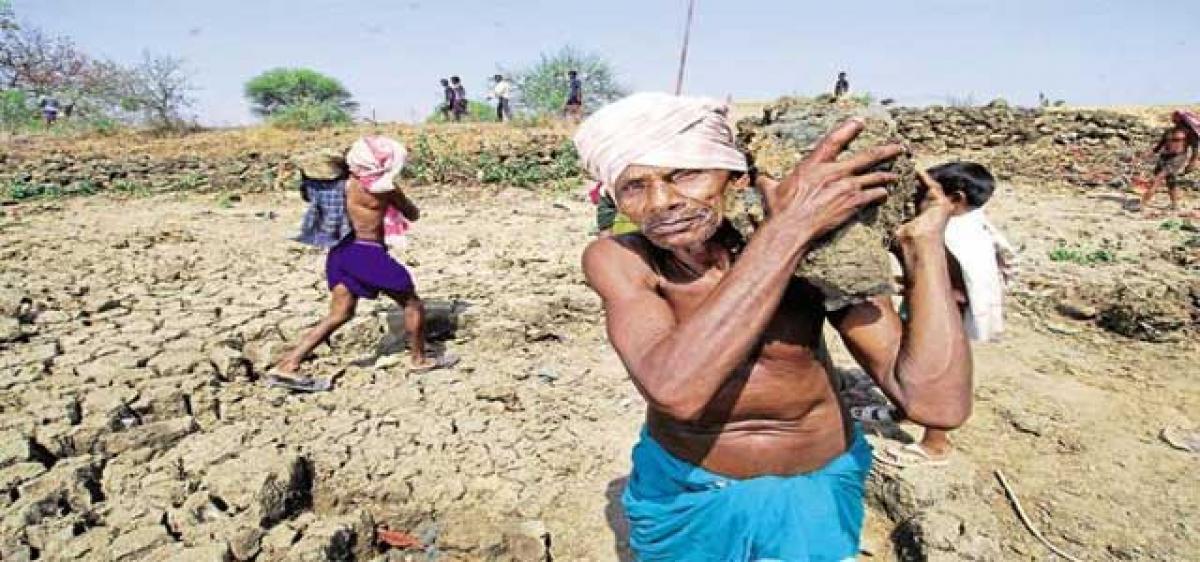Live
- Omar Abdullah Urges Congress To Earn INDIA Bloc Leadership Role
- Historic Temple In Sambhal Reopens After 46-Year Closure Following 1978 Riots
- Officials directed to work for deeper reach of guarantees
- Delay In 'One Nation, One Election' Bills Introduction Announced
- Exhilarating ‘Benchmark’ of Venkat Changavalli
- Development activities worth `30 cr launched in Puthalapattu constituency
- Allegations against KTR baseless: BRS leader
- Megastar Chiranjeevi to Visit Allu Arjun’s Residence at 12 PM Today
- Nilima Rane: Trailblazer in Nursing
- Casual yet stylish office outfits for all-day comfort
Just In

The Economic Survey considers Universal Basic Income Scheme (UBI) an alternative to a host of anti-poverty and social welfare schemes being implemented by central and state governments. On the face of it, this may sound like a fascinating ideational shift. But, it’s nothing but another name for the much debated and much disputed Direct Cash Transfers scheme.
The Economic Survey considers Universal Basic Income Scheme (UBI) an alternative to a host of anti-poverty and social welfare schemes being implemented by central and state governments. On the face of it, this may sound like a fascinating ideational shift. But, it’s nothing but another name for the much debated and much disputed Direct Cash Transfers scheme.
It’s rather surprising to note Economic Survey pitching for the idea even as the world at large including developed countries is still perusing the idea and its pitfalls.
In Switzerland, a referendum last June on a UBI for the country had seen an overwhelming 77 per cent of the voters rejecting this. Even the NITI Aayog has already said India does not have necessary financial resources for the project.
Particularly, the Survey stresses that the UBI should be an alternative, not another add-on, to social welfare schemes. Though aimed at checking leakages in delivery of welfare schemes, UBI may eventually do away with PDS and MGNREGS, affect food security, and further deepen farmers' distress.
In case this recommendation is accepted, unwittingly or by design, the government may have met the demand of rich nations to end state procurement of grains for the PDS. How can it leave farmers at mercy of market forces and still help them double their income by 2020?
If the government is really serious about helping the poor and vulnerable, it should begin with implementing a universal basic pension and a decent minimum wage for all working people. Before embarking upon such ideational shifts in welfare policies, the government should author an economic policy regime that addresses the problem of humongous income inequalities.
The advocates of such schemes argue that there are leakages in implementation of welfare schemes and therefore giving cash directly to the poor is a better idea. But, the paradigm shift away from conventional approach to welfare is not without its share of implementation problems.
If it’s truly a basic income to meet the basic needs of the people, it would entail massive financial requirement. Estimates put this figure at as high as 12 per cent of India’s GDP even if the basic income is pegged at Rs 1,000-1,250 a month.
This requires a political commitment to massively tax the rich. Such an indiscriminate high taxation can have negative consequences for the economy, too. Otherwise, the UBI would not be an add-on benefit to the existing government schemes. Precisely, this is what the Economic Survey advocates. The basic income when transferred in the form of cash would be subject to constant devaluation due to inflation.
The cash transfers thus turn the Universal Basic Income into neither universal nor basic but a prescribed income for the targeted, whose value would see depreciation.
Instead, the government should author a robust public policy regime that guarantees universal basic needs like education, health, nutrition, sanitation, drinking water etc. Any rollback of public distribution system, mid-day meals, jobs scheme etc., would further erode India’s human development status.

© 2024 Hyderabad Media House Limited/The Hans India. All rights reserved. Powered by hocalwire.com







